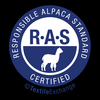
Responsible Alpaca Standard
About (Responsible Alpaca Standard)
The Responsible Alpaca Standard (RAS) is a comprehensive framework that aims to promote the welfare of alpacas and improve sustainability practices in the alpaca fiber industry. It sets guidelines and requirements for responsible alpaca farming and fiber production, addressing key areas such as animal welfare, land management, and social responsibility.
The RAS was developed through a collaborative effort involving various stakeholders, including farmers, animal welfare organizations, and industry experts. The standard provides clear criteria and performance indicators to assess and verify compliance with responsible practices throughout the alpaca fiber supply chain.
Key elements of the Responsible Alpaca Standard include:
Animal welfare: The standard establishes guidelines for the humane treatment and care of alpacas, addressing aspects such as housing conditions, nutrition, health management, and handling practices. It emphasizes the provision of appropriate living environments that meet the natural behavioral needs of the animals.
Land management: The RAS encourages responsible land management practices that promote biodiversity, soil health, and ecosystem protection. It encourages sustainable grazing practices, water conservation, and the preservation of natural habitats.
Fiber production: The standard sets requirements for the processing and production of alpaca fiber, including practices that minimize waste, reduce the use of harmful chemicals, and ensure traceability and transparency throughout the supply chain.
Social responsibility: The RAS promotes fair labor practices, safe working conditions, and respect for human rights within the alpaca fiber industry. It encourages transparency in business operations, fair wages, and opportunities for local communities.
To ensure compliance with the Responsible Alpaca Standard, farms and fiber processors undergo assessments conducted by independent third-party certifiers. These assessments include on-site visits, document reviews, and interviews with stakeholders. If the requirements of the standard are met, the farm or processor may receive certification, indicating their adherence to responsible practices.
Benefits of the Responsible Alpaca Standard include:
Animal welfare: The standard prioritizes the well-being of alpacas, ensuring that they are treated with respect and provided with optimal living conditions.
Sustainability: The RAS promotes sustainable practices that minimize environmental impact, conserve natural resources, and protect ecosystems.
Consumer confidence: Certification under the Responsible Alpaca Standard provides assurance to consumers that alpaca products come from sources that prioritize animal welfare and sustainable production.
Industry credibility: The standard enhances the credibility and reputation of alpaca fiber suppliers, demonstrating their commitment to responsible practices and sustainability.
It's important to note that the Responsible Alpaca Standard is a relatively new initiative, and its implementation and recognition may vary. To obtain detailed information about the standard, its specific requirements, and certified farms or processors, it is recommended to refer to the official Responsible Alpaca Standard website or consult with accredited certifiers and experts in the alpaca fiber industry.